Book contents
- Frontmatter
- Contents
- List of Contributors
- Introduction to Kripke
- Part I Naming, Necessity, and Apriority
- Part II Formal Semantics, Truth, Philosophy of Mathematics, and Philosophy of Logic
- Part III Language and Mind
- Part IV Philosophy of Mind and Philosophical Psychology
- 13 Kripke and Cartesianism
- 14 Not Even Computing Machines Can Follow Rules
- Index
- References
14 - Not Even Computing Machines Can Follow Rules
Kripke’s Critique of Functionalism
Published online by Cambridge University Press: 05 June 2012
- Frontmatter
- Contents
- List of Contributors
- Introduction to Kripke
- Part I Naming, Necessity, and Apriority
- Part II Formal Semantics, Truth, Philosophy of Mathematics, and Philosophy of Logic
- Part III Language and Mind
- Part IV Philosophy of Mind and Philosophical Psychology
- 13 Kripke and Cartesianism
- 14 Not Even Computing Machines Can Follow Rules
- Index
- References
Summary
Abstract
Saul Kripke’s refutation of functionalism, unlike any previous attempts at a refutation, is a corollary of his work in Wittgenstein: On Rules and Private Language; in particular, it is a corollary of the arguments against dispositionalist (and extended dispositionalist) solutions to the meaning normativity paradox. Kripke’s attack is, as he acknowledges, the weakest possible, since it focuses on what many take to be the strongest aspect of functionalism: that a physical computing machine embodies the abstract diagrams of a mathematical automaton. However, any physical computing machine imperfectly realizes those abstract diagrams, since physical machines may either break down or malfunction. Indeed, that they do so is something we know only if we assume that the physical computing machine computes the function that we take it to compute. If it does not compute that function, then what we take to be a breakdown might, in fact, be part of its normal conditions of operation. That is, it might be computing a different function and not undergoing a breakdown of any sort at all. Unless we idealize its behavior, it might compute any function at all. But how we idealize its behavior depends upon what function we take it to compute. In the absence of idealizing its behavior, we don’t know what function it computes. But we can only idealize its behavior if we already know what function it computes.
- Type
- Chapter
- Information
- Saul Kripke , pp. 343 - 368Publisher: Cambridge University PressPrint publication year: 2011
References
- 2
- Cited by

